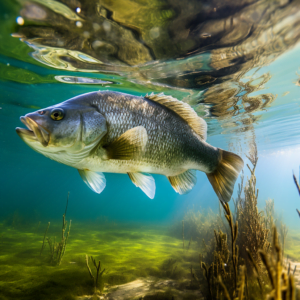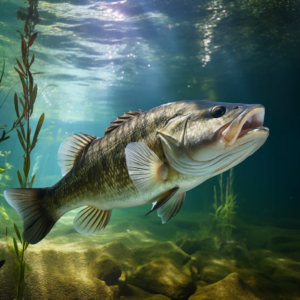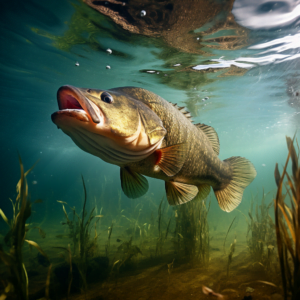So, have you ever been out on the water, all ready to catch some bass, only to be met with disappointment when they just refuse to bite? It can be frustrating, right? Well, you’re not alone. Many anglers have had this experience, and there are actually several common reasons why bass may not be biting. Don’t worry though, in this article, we’ll dive into these reasons and give you some tips on how to overcome them and increase your chances of a successful fishing trip.
One possible reason why bass may not be biting is because of the weather. Bass are cold-blooded creatures, which means their activity levels are greatly influenced by temperature. If the water is too cold or too hot, they might not be as willing to chase after your bait. Additionally, drastic changes in weather, such as sudden drops in temperature or storms, can also make bass more inactive. We’ll explore more about how weather affects bass behavior in the upcoming article, so stay tuned!
Another reason bass may be refusing to bite is because of their feeding habits. Bass are opportunistic predators, and they are more likely to bite when it is easy for them to catch their prey. If the lake or river you’re fishing in is teeming with an abundance of natural food sources, such as baitfish or insects, the bass might not be interested in your artificial bait. However, fear not! There are ways to overcome this obstacle and entice those bass to take a bite, which we’ll cover in the article ahead.
Lastly, the time of day can also play a role in whether or not bass are biting. Bass are most active during dawn and dusk, also known as the “prime feeding times.” During these periods, their metabolism is higher, and they are more likely to actively seek out and attack their prey. If you find yourself fishing during the middle of the day when the sun is high in the sky, it’s not impossible to catch bass, but your chances may be lower. We’ll discuss strategies for fishing during different times of the day later on in the article.
So, there you have it – a glimpse into some of the common reasons why bass may refuse to bite. In the upcoming article, we’ll delve deeper into each of these factors and provide you with practical tips to help you overcome them and increase your chances of a successful bass fishing trip. Stay tuned to learn more!
| Factor | Details | Tips & Solutions |
|---|---|---|
| Weather Conditions | – Affects bass activity levels | – Fish during stable conditions |
| – Extreme temperatures may lead to less biting | – Monitor weather forecasts | |
| Feeding Habits | – Availability of natural food sources | – Use lures that mimic local prey |
| – Inactivity during non-feeding times | – Fish during dawn and dusk for optimal activity | |
| Lure Selection | – Choosing the right type, size, and color | – Experiment with different lures |
| – Mimicking the prevalent prey | – Observe water conditions and adapt lure choice | |
| Time of Day | – Active during dawn and dusk (prime feeding times) | – Focus fishing efforts during early morning or late evening |
| – Less activity under the high midday sun | – Utilize shaded areas during bright daylight | |
| Water Temperature | – Affects bass metabolism and activity | – Fish during seasons with optimal temperatures |
| – Inactivity during too cold or hot conditions | – Target deeper waters in hot weather for cooler temperatures | |
| Water Quality | – Poor quality may reduce activity | – Choose fishing locations with good water quality |
| – Pollution, low oxygen can impact health and behavior | – Support conservation efforts |
Common Reasons Why Bass Refuse to Bite
Bass fishing is an exhilarating and rewarding experience. However, there are times when those elusive bass refuse to bite, leaving you scratching your head in frustration. So, why do bass not bite? In this article, we will explore the common reasons behind this phenomenon and provide insights on how to enhance your chances of hooking that trophy bass.
Lack of Proper Presentation
One of the most common reasons why bass refuse to bite is the improper presentation of your bait or lure. Bass possess keen senses and are highly attuned to their surroundings. If your presentation does not mimic the natural movement and behavior of their prey, they are more likely to ignore your offering. Make sure to use the appropriate techniques, such as slow retrieves, jerking motions, or subtle movements, depending on the type of bait or lure you are using.
Unfavorable Weather Conditions
Weather plays a significant role in bass behavior and feeding patterns. When faced with adverse weather conditions such as extreme heat, cold fronts, or high winds, bass tend to become less active and more reluctant to bite. It is important to monitor the weather forecast and plan your fishing trips accordingly. Take advantage of stable weather conditions, such as mild temperatures and calm winds, to increase your chances of enticing bass to strike.
Inadequate Lure Selection
Choosing the right lure for the prevailing conditions is crucial in enticing bass to bite. Bass can be finicky creatures, and their preferences can vary depending on many factors, including water clarity, season, and prey availability. Experiment with different types, sizes, and colors of lures until you find what the bass are actively feeding on. Keep in mind that bass can be selective, so it is essential to tailor your lure selection to match the specific conditions of the water body you are fishing.
Spooked or Alerted Bass
Bass are highly aware of their surroundings and can easily be spooked or alerted by noise, vibrations, or sudden movements. If you are not stealthy in your approach, you run the risk of scaring away the bass before you even have a chance to cast your line. Practice stealth tactics such as keeping a low profile, using light and accurate casts, and minimizing unnecessary movements and disturbances. By doing so, you increase your chances of sneaking up on unsuspecting bass and enticing them to bite.
Unsuitable Water Temperature
Water temperature is a critical factor in bass feeding behavior. Bass are cold-blooded creatures, meaning their body temperature is influenced by the surrounding water. If the water temperature is too hot or too cold, bass become less active and may not be as willing to bite. Pay attention to the seasonal patterns and the preferred temperature range for bass in your region. Fishing during the early morning or late evening, when the water temperature is more favorable, can significantly increase your chances of success.
Poor Water Quality
Bass thrive in clean and healthy water environments. Poor water quality, such as excessive pollution, algae blooms, or low oxygen levels, can have a detrimental effect on bass and their feeding behavior. When encountering such conditions, bass may become less active and refuse to bite. It is important to choose fishing locations with good water quality or adapt your fishing techniques to accommodate for the unfavorable conditions. Additionally, support conservation efforts to preserve and improve the water quality of bass habitats.
Prey Availability
Bass are opportunistic predators and are constantly on the lookout for their next meal. If there is a lack of prey availability in the area you are fishing, bass may not be as motivated to bite. Pay attention to the natural food sources in the water body you are targeting. Observe the behavior of local baitfish, insects, or other prey species that bass commonly feed on. Matching your bait or lure to the prevalent prey can dramatically increase your chances of enticing a bass to strike.
Seasonal Patterns
Seasonal patterns heavily influence bass behavior and feeding habits. Bass have predictable movements and preferences throughout the year, adapting to the changing seasons. Understanding these patterns can significantly enhance your chances of success. During the spawning season, for example, bass may be more focused on protecting their nests and less likely to bite. Adjust your tactics accordingly by targeting pre-spawn or post-spawn areas to increase your chances of encountering active and hungry bass.
Equipment Malfunction
Sometimes, the reason why bass refuse to bite may not be related to their behavior but rather a malfunction or flaw in your fishing equipment. Check that your rod, reel, line, and hooks are in good working condition and properly suited for the type of bass fishing you are pursuing. A dull or incorrect hook size, a faulty reel, or improperly spooled line can all contribute to missed opportunities. Regularly maintain and inspect your gear to ensure optimal performance and maximize your chances of landing that elusive bass.
Conclusion
While it can be disheartening when bass refuse to bite, understanding the common reasons behind their behavior can improve your chances of success. By ensuring proper presentation, adapting to weather conditions, selecting the right lure, practicing stealth, considering water temperature and quality, monitoring prey availability, following seasonal patterns, and maintaining your equipment, you set yourself up for a more fruitful fishing experience. Remember, bass fishing is both an art and science, and with knowledge, patience, and perseverance, you can increase your odds of hooking that prized bass. So, get out on the water, apply these insights, and let the adventure begin!




